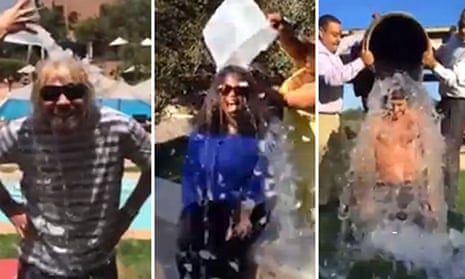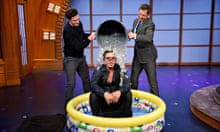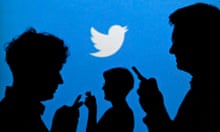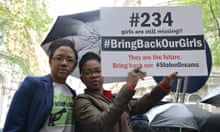With the likes of Lady Gaga, David Beckham, Oprah Winfrey, Mark Zuckerberg and many more taking on the challenge, it is no surprise that #icebucketchallenge has gone viral on a global scale. It’s so far raised $22.9m (£13.8m) for the ALS Association – a US-based charity committed to fighting Amyotrophic Lateral Sclerosis (ALS).
The #icebucketchallenge appeared to begin when Pete Frates, a former Boston College baseball player who has ALS, posted a video on Facebook challenging professional baseball players to take the challenge of dumping a bucket full of ice water over your head. Soon celebrities, business leaders and politicians were taking on the challenge and nominating others to do the same.
As with the case of #nomakeupselfie, the campaign was not started by the charity – yet the ALS Association have been able to drive the success of the challenge forward through the use of social media and actively engaging with participants. The phenomenon appeared in the US around mid-July 2014 and started gathering pace in the UK a few weeks ago when Macmillan Cancer Support retweeted an #icebucketchallenge video by one of their supporter’s videos on 4 August 2014.
So far, 50,000 people, including celebrities like Richard Branson, have taken part in the #icebucketchallenge for Macmillan and raised enough to fund one Macmillan nurse for a year. The charity is promoting the challenge and hashtag on its website. However, this has raised concerns among the third sector over whether it is OK for a charity to take the focus, and quite possibly donations, from another cause or organisation.
ALS is a form of Motor Neurone Disease (MND), so perhaps it would make sense that those taking part in the #icebucketchallenge raised funds to fight MND, not cancer?
Social media experts might argue that no one owns a hashtag and, to date, I would agree. Even hashtags that are created for trademarked events, conferences, movies or music releases are not exclusive to particular campaigns or organisations.
As with the viral campaign #nomakeupselfie, it was the charities that were quick and flexible enough to embrace the social media tide that were successful. Although Cancer research UK received the majority of the donations from #nomakeupselfie other charities such as Breast Cancer Campaign received £135,000.
Clearly it is a formula that works on social media – but, is Macmillan wrong to take the focus away from #icebucketchallenge’s original cause?
Sarah Fitzgerald, director of Self Communications, says: “With #icebucket challenge being so clearly connected to ALS, Macmillan’s actions do raise questions about how far they took that into consideration when they began investing so heavily in stamping it with their own identity.
“For smaller organisations like the MND charities that are looking to get traction and awareness, it’s hard to respond to.”
On the other hand Zoe Amar, director of Zoe Amar Communications, says: “Macmillan has simply listened to their audience, noticed that they had an appetite to use the #icebucketchallenge to support their cause and encouraged them.
“As with #nomakeupselfie, this is a movement, not a campaign led by an organisation – so I don’t think any one cause to lay claim to it. I would advise any charity to ready themselves for similar opportunities in the future.”
Charities have been using each other’s fundraising ideas, such as tea parties or fun runs, since the dawn of time so is this really much different? Perhaps these social media campaigns and internet memes are just a new form of fundraising in a digital age.
Kirsty Marrins is a content and community manager at JustGiving.
If you work in the charity sector, please join our free network for charity professionals.
What do you think – is it ok for charities to jump on a hashtag? Have you done so – tell us why it worked for you via our comment section or Twitter (@GdnVoluntary).










